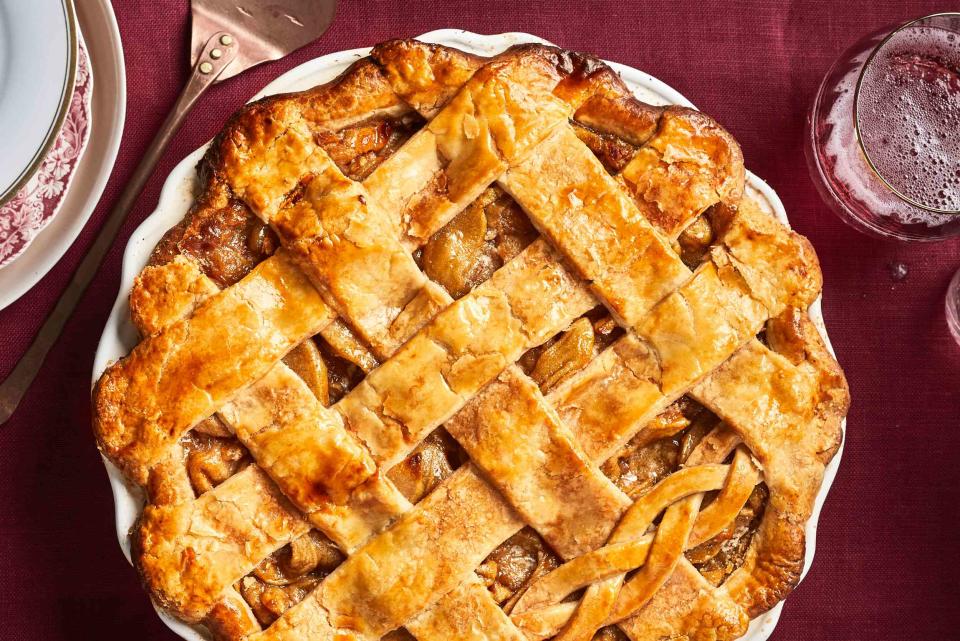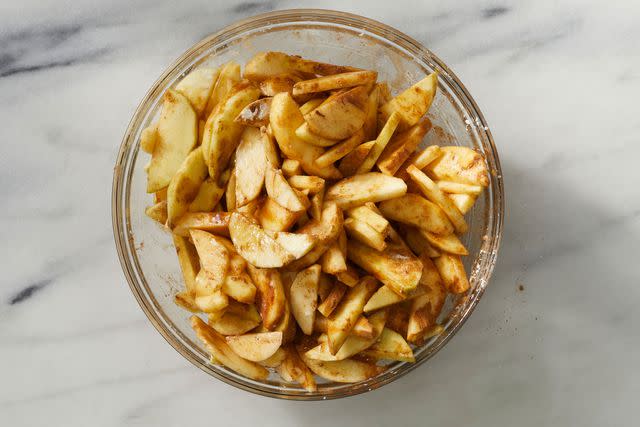We’re here to help you avoid these common pitfalls of pie making.

Greg DuPree; Prop Styling: Kathleen Varner; Food Styling: Marian Cooper Cairns
There is nothing like a fresh-out-of-the-oven apple pie, a staple in Americana and pretty much any fall dinner table, summer picnic, or 4th of July barbecue.
Baking a pie is complex work though, and even with the ideal recipe, it’s hard to achieve perfection on the first go around. That’s why we rounded up the most common apple pie mistakes. We’re offering our best advice on how to fix those pie-making errors so you can quickly become the apple pie expert in your family.
Overworking the Dough
The goal is to achieve a light and flaky pie crust, not one that is dense and hard.
Lillian Lu, owner and pastry chef at Noisette in Denver thinks one of the most common mistakes is overworking the pie dough, and it’s an easy mistake to make.
Make sure you are working with a well-chilled crust so things don’t get crazy sticky and you feel the need to keep adding flour (which will lead to a dry, dense crust). Also make sure you are mixing until combined, not mixing until things look perfectly uniform, or again you’ll be on the path of overworking the dough. Same goes for the kneading part!
:
Not Planning for Watery Apples
One of the biggest mistakes people make is not precooking the apples which can result in a soggy pie. Sarah Howlett, pastry chef at Formento’s in Chicago says “The nerdy long explanation: Apples contain a lot of water,” she says. “When you add raw apples to the pie, that water is released and causes soggy crusts, and the apples will deflate, causing a gap between filling and top crust.”
Katie Chaney, owner and proprietor of Hester General Store in Dacusville, South Carolina. suggests adding sugar to your cut apples and letting them sit in the pot for 30-45 minutes before cooking. “This allows the sugars to draw out moisture from apples, which you can then cook down for a beautiful sauce base for the apple pie.”
Many people add in a thickening agent like cornstarch or flour, too.

Rob Culpepper, Food Stylist: Chelsea Zimmer, Assistant Prop Stylist: Josh Hoggle
:
Not Cutting the Apples Properly
Does your filling end up mushy or applesauce like? It’s most likely because you aren’t cutting your apples properly.
Chef Jessica Scott, corporate pastry chef of 50 Eggs Hospitality Group says, ” Apples naturally have high water content, and when they are cooked, they shrink a lot. By cutting your fruit into thick slices or wedges, you ensure that the apple pie won’t become an apple-sauce pie!”
You’ll want uniform slices, so they all cook at the same rate. If you prefer a filling with chunky diced apples, that’s OK too, if you don’t make the chunks too small.
:
Picking the Wrong Apples
If your apple pie does not have that delicious apple taste when it comes out of the oven but instead tastes more like a mushy pile of nothing, you are likely using the wrong apples. Granny Smith apples tend to be a favorite when making pie for their tartness and firmness. Many people will mix it up with a combination of Granny Smith and Honeycrisp, or add in picks like Golden Delicious, Braeburn, or Jonagold.
Underbaking the Pie
It’s super tempting to pull the pie out of the oven so it doesn’t burn, but when you do that, you’ll often find that your pie is missing that golden, flaky crisp crust.
Erin Mooney, corporate pastry chef at Scott Harris Hospitality Group says, “Oftentimes, pies will achieve the golden-brown crust before the apples begin to bubble. When this happens, remove the golden-brown crusted pie, and tent it with a piece of aluminum foil. This will let the pie continue to bake the apple filling, without burning the crust.”
Not Egg Washing the Crust
Wondering why your apple pie doesn’t have that golden look? That’s likely because you forgot to egg wash the crust (or it’s underbaked). says Olivia Rinke, pastry chef at Hazel’s in Birmingham, Michigan. “Don’t forget to brush your apple pie crust with an egg wash before baking it to get a golden crust. This is an important step every time.”
:
Not Waiting for the Pie to Cool
Yes, we know, waiting to dig into a freshly baked pie can be torture. But if you don’t wait for your pie to cool, you can ruin the pie.
Chef Michael McKinnell, executive chef at Mordecai in Chicago, says he has seen it happen, not just with home cooks but even restaurant chefs.
“You really want to let the sugars in your filling settle before jumping in headfirst,” he says. “A good rule of thumb is to let them chill at room temperature for at least an hour before diving in. If you cut into your dough before it has settled, it will become gummy and there is no fix to that.”
For more Southern Living news, make sure to sign up for our newsletter!
Read the original article on Southern Living.




